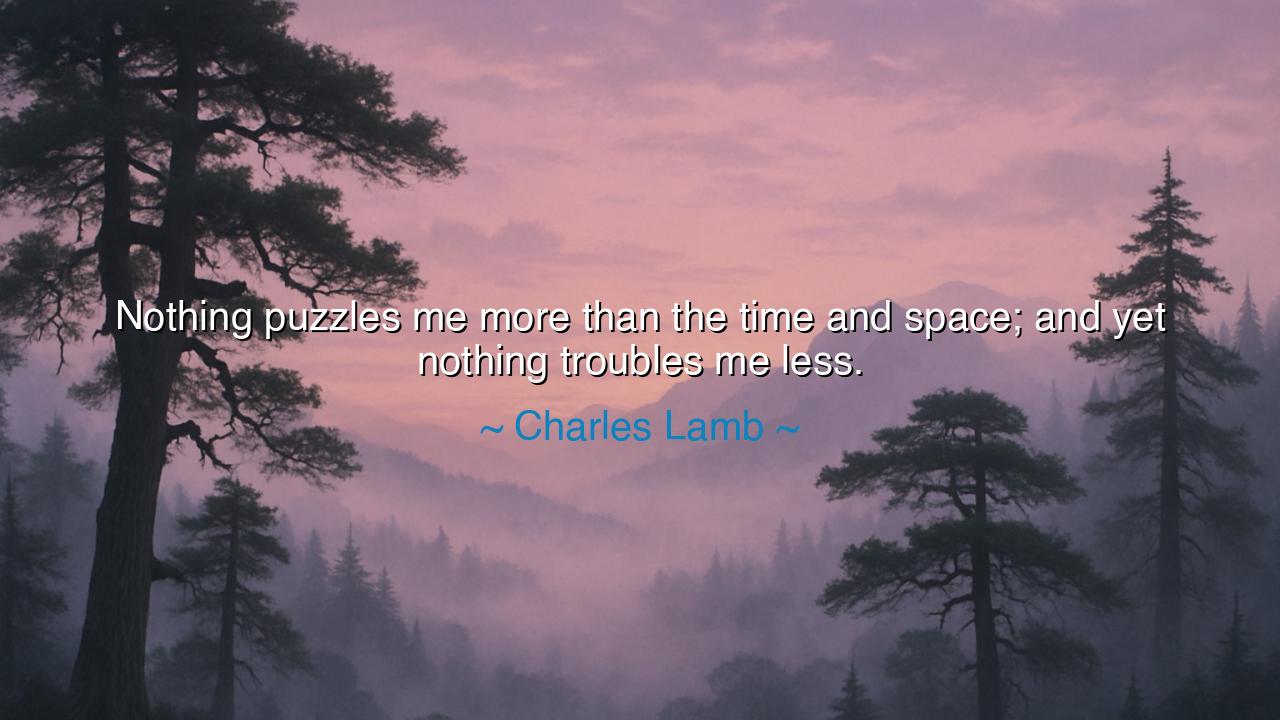
Nothing puzzles me more than the time and space; and yet nothing






Hear the gentle yet profound words of Charles Lamb, the essayist whose pen captured both the humor and the sorrow of human life: “Nothing puzzles me more than the time and space; and yet nothing troubles me less.” In this utterance lies a paradox, one of those riddles that sits at the edge of philosophy and poetry. For Lamb confesses that the mysteries of time and space—those vast and unfathomable realities—are beyond his comprehension, yet he also declares that such mysteries bring him no trouble. In this balance of wonder and peace lies a wisdom that generations may heed.
The origin of these words is found in Lamb’s essays, written in the early 19th century, when science was beginning to probe more deeply into the nature of the cosmos, but long before Einstein and modern physics reshaped human understanding of space-time. Lamb, however, was not a physicist but a poet of the ordinary, a writer of the human heart. His reflection shows the timeless truth: the greatest mysteries—what time is, what space is, how they contain us—may puzzle the mind, but they need not disturb the soul. For though we cannot fully understand them, we dwell within them as naturally as a fish dwells in the sea.
Consider how the ancients viewed these mysteries. Augustine of Hippo once said, “What, then, is time? If no one asks me, I know; if I wish to explain it, I know not.” The greatest minds of every age have been confounded by time and space, yet humanity endures. For while they are beyond our grasp, they are also the very fabric of our existence. To live is to move through them, regardless of whether we can define them. Lamb’s words echo this humility: we may not solve the riddle, but we can rest in it without fear.
History provides an example in the life of Galileo. When he looked through his telescope and saw the moons of Jupiter, the vastness of space suddenly grew larger in the human imagination. Many were troubled—afraid, shaken, resistant to this expansion of the cosmos. Yet Galileo himself, though imprisoned for his truth, was not troubled by the mystery; he embraced it, knowing that ignorance should awaken wonder rather than fear. So too does Lamb’s saying remind us: what puzzles need not oppress, what cannot be solved may still be embraced with peace.
The emotional power of this quote lies in its simplicity. Time steals from us all things—youth, strength, even life itself—yet Lamb declares he is not troubled. Space stretches endlessly, its distances vast beyond imagining—yet Lamb is at ease. His teaching is that peace comes not from mastering the universe, but from accepting our place within it. To be puzzled is human; to be troubled is a choice. By choosing acceptance, we gain serenity in the face of infinity.
The lesson is thus: let not the mysteries of existence weigh you down. Wonder at them, yes—ponder them, marvel at them—but do not let them rob you of peace. You cannot halt time, nor measure all of space; but you can walk through both with gratitude, knowing they are the stage upon which your life unfolds. To struggle against them is futile; to accept them is freedom.
And so, what practical actions should we take? First, learn to rest in mystery. When life presents questions too vast to answer—why we are here, how time moves, what lies beyond the stars—do not let them trouble your spirit. Second, cherish the time you have, though it is fleeting, for its limits give your life meaning. Third, use the space around you well—fill it with kindness, with beauty, with love—so that even though you cannot comprehend the whole cosmos, the part you touch becomes brighter. In this way, Lamb’s humble reflection becomes a guide for living: embrace the puzzle, release the fear, and walk in peace through the unfathomable.






AAdministratorAdministrator
Welcome, honored guests. Please leave a comment, we will respond soon